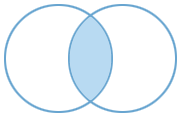The Family/Business Overlap
 The
Family/Business Overlap is a concept in the study of family-owned
businesses. Simply stated, when family members work together in or share
ownership of a business, it is virtually impossible for the business to
function independently of the family, and vice versa.
The
Family/Business Overlap is a concept in the study of family-owned
businesses. Simply stated, when family members work together in or share
ownership of a business, it is virtually impossible for the business to
function independently of the family, and vice versa.
This mutual dependency is, in fact, one of the major reasons for families being in business together. Success becomes a double success; growth of the business engenders family pride. Familiarity breeds trust, and family members can spend time together. These positive overlaps alone may be the major reason for the preponderance of family-owned businesses in the United States.
However, this overlap can also be a source of great stress. How do you tell your son or daughter, brother, sister or spouse, that they are not doing a good job? When a father and son clash over a strategic business decision, is this based upon different views of their market, differences in management styles that are generationally based, a good old-fashioned father-son struggle for power and control, or a mutual seeking of recognition, acceptance, and even closeness?
Helping to understand and answer these questions is the primary function of the family business consultant, especially those who assist with the process of change in family businesses. An example is when a family is attempting to pass the business to the next generation. Times of change are full of excitement, tension, and confusion which tends to increase the amount of overlap between family and business, and blur that which is already difficult to distinguish.
Examples of "family" versus "business" can be: Transition in management and leadership of company (business) versus aging and death of older generation (family); Choosing a competent successor (business) versus feeling accepted and recognized by parents (especially father) (family); Dividing ownership equitably, including recognizing each individual's contribution to the business (business) versus feeling equally loved by parents (family); Letting go of roles, relationships, and connections to the (business) versus defining the new relationships of the latter stages of life (family); Assigning the key roles to non-family mem-bers (business); versus defining family loyalty (family).
As the family struggles to differentiate and resolve these issues, a number of themes frequently appear. One of these is triangulation. Simply put, this is the tendency in relationships to pull a third person into a problem when the two people involved feel stuck in resolving it.
Unfortunately, this is often done unilaterally and indirectly, so that when A and B are stuck, one or both approach C to complain about the other. The most frequent triangle family business consultants encounter is Father/Son/Mother even when mom is not playing an important role in business.
Dad's "business" message to son may be, "I need to be sure that you are competent before I turn leadership over to you" (which may mean, lead like I do). Son hears the "family" message, "You've never really been the kind of son (man) I wanted you to be." Dad goes to mom to complain about son's anger and disruptiveness with employees (business), and mom empathizes with her son's need for recognition (family). Son goes to mom to complain that dad is not supportive, and never has been (family), and mom, concerned about the business that she helped dad successfully build, tells son he has to try harder (business).
